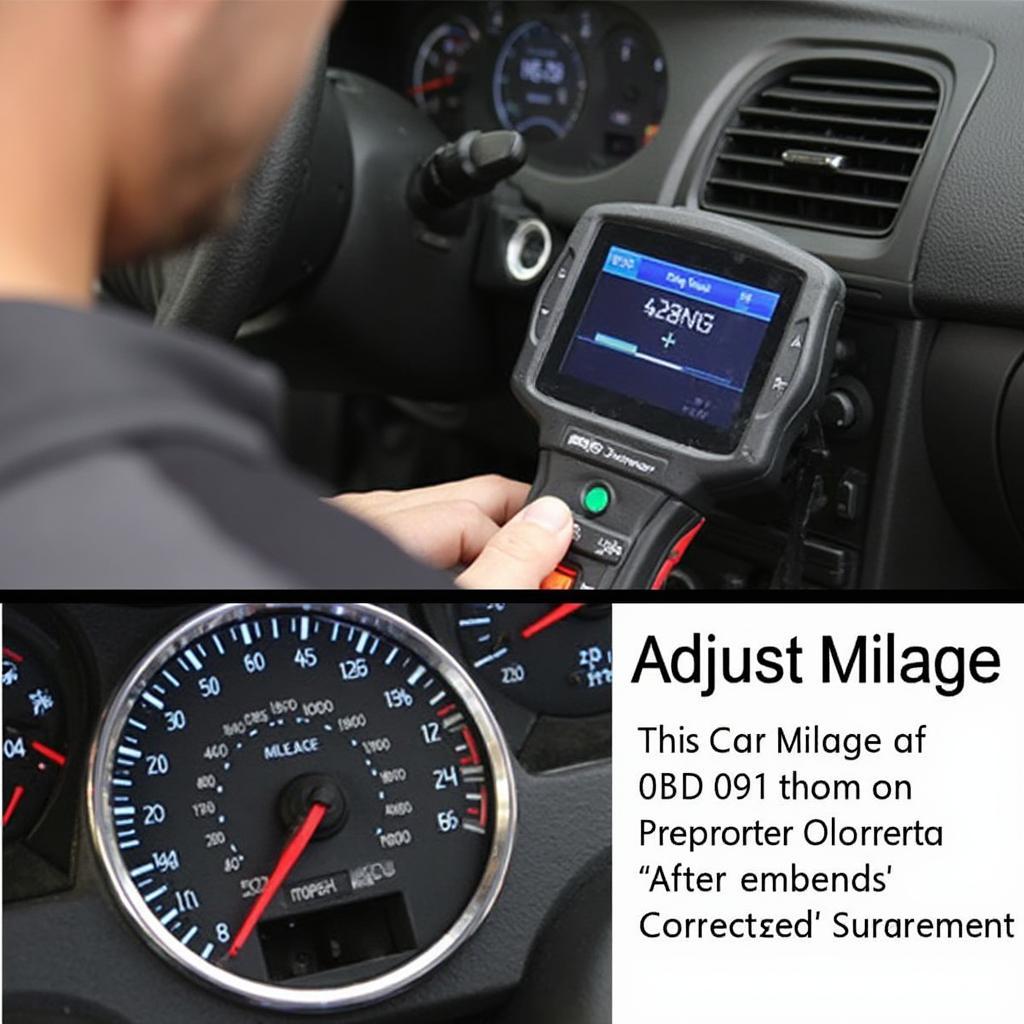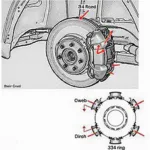OBD2 odometer adjustment is a complex topic surrounded by myths and misconceptions. Understanding the legality, risks, and potential benefits of adjusting your vehicle’s mileage requires accurate information. This article will provide a comprehensive overview of OBD2 odometer adjustment, covering everything from the technical aspects to the legal implications.
Understanding OBD2 and Odometer Adjustment
OBD2, or On-Board Diagnostics II, is a standardized system that allows external devices to access a vehicle’s computer and retrieve diagnostic information. While primarily used for troubleshooting and repairs, some tools claim to offer odometer adjustment capabilities. It’s crucial to understand the difference between legitimate reasons for adjusting the odometer (such as instrument cluster replacement) and illegal odometer tampering.
Legitimate Reasons for Odometer Adjustment
Sometimes, an odometer needs to be corrected due to mechanical failures, instrument cluster replacements, or even tire size changes. These adjustments are legal when properly documented and performed by qualified technicians. In such cases, maintaining accurate mileage records is vital.
Illegal Odometer Tampering
Tampering with the odometer to misrepresent a vehicle’s mileage for financial gain is illegal. This fraudulent practice can deceive potential buyers and impact the resale value of a car. The consequences of odometer fraud can be severe, including hefty fines and even imprisonment.
How OBD2 Odometer Adjustment Tools Work (and the Risks Involved)
Some OBD2 tools advertised online claim to adjust a vehicle’s odometer. These tools often target specific vehicle makes and models and promise a quick and easy process. However, using such tools carries significant risks.
Potential Damage to the Vehicle’s Computer System
Incorrectly using these tools can corrupt the vehicle’s computer system, leading to costly repairs and potential malfunctions. The complexity of modern vehicle electronics makes it easy to unintentionally cause damage.
Legal Ramifications
Using OBD2 tools for fraudulent odometer adjustment can have severe legal consequences. Beyond fines and legal action, it can also impact your insurance rates and create difficulties when selling the vehicle in the future.
Identifying Odometer Tampering
As a buyer, knowing how to spot potential odometer tampering is crucial. Look for inconsistencies in the vehicle’s paperwork, such as discrepancies between the mileage on the title and the car’s condition. Physical signs of wear and tear can also indicate a higher mileage than displayed.
Checking Vehicle History Reports
A vehicle history report can provide valuable insights into the vehicle’s mileage history. These reports can reveal any inconsistencies or red flags that may indicate odometer fraud.
“Always check a vehicle’s history report before purchasing,” advises John Smith, Automotive Technician at Smith’s Auto Repair. “It’s a small investment that can save you from a costly mistake.”
Alternatives to OBD2 Odometer Adjustment
If you need to correct your vehicle’s odometer for legitimate reasons, consult a qualified mechanic. They can perform the adjustment legally and safely, ensuring the accuracy of your vehicle’s mileage. Documenting the process thoroughly is crucial for maintaining transparency and avoiding future issues.
“Proper documentation is key when adjusting a vehicle’s odometer,” states Jane Doe, Certified Mechanic at Doe’s Auto Solutions. “It protects both the vehicle owner and the mechanic.”
Conclusion
OBD2 odometer adjustment is a sensitive issue. While legitimate reasons for adjusting a vehicle’s odometer exist, using OBD2 tools for fraudulent purposes is illegal and carries severe consequences. Always prioritize ethical practices and consult a qualified professional for any odometer-related concerns. Understanding the legal and technical implications of OBD2 odometer adjustment empowers you to make informed decisions and avoid potential pitfalls.
FAQ
- Is it legal to adjust my odometer? It depends on the reason and the method. Legitimate adjustments due to repairs require proper documentation. Fraudulent adjustments are illegal.
- Can I use an OBD2 scanner to adjust my odometer? While some tools claim this capability, using them carries significant risks and can be illegal.
- How can I tell if a car’s odometer has been tampered with? Look for inconsistencies in paperwork, physical signs of wear, and check the vehicle history report.
- What should I do if I suspect odometer fraud? Report it to the appropriate authorities and avoid purchasing the vehicle.
- Where can I get my odometer legally adjusted? Consult a qualified and reputable mechanic.
- What information should be documented during a legal odometer adjustment? The reason for the adjustment, the previous mileage, the adjusted mileage, and the date of the adjustment.
- How can I protect myself from buying a car with a tampered odometer? Obtain a vehicle history report and have a trusted mechanic inspect the car.
If you need assistance, please contact us via WhatsApp: +1(641)206-8880, or Email: [email protected]. We have a 24/7 customer support team.


